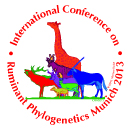International Conference on Ruminant Phylogenetics Munich 2013
 GeoBio-CenterLMU, September 3–6, 2013
GeoBio-CenterLMU, September 3–6, 2013
Conference background and aim
Ruminants are the most abundant (over 3 billion individuals) and diverse (over 300 species) group of ungulates. They include some of the most agriculturally, environmentally, economically and culturally important species on earth. Ruminants display a fascinating spectrum of adaptations allowing them to successfully inhabit nearly every terrestrial biome. Yet, the evolutionary history of ruminants remains unresolved. The fossil record documents 43 million years of diversification including several key radiations, each marking important steps in ruminant cladogenesis. At least thirteen million years of this history occurred before the origin of the living ruminant families. This long time of radiations and extinctions makes ruminants an ideal group in which to study many aspects of evolutionary theory, including selection and speciation.
Ruminant phylogenetics have been the subject of scientific interest since the initial Linnean classification in 1735. Many competing phylogenetic hypotheses have been advanced since then, linking the eight extinct and the six surviving ruminant families in almost every possible manner. For 250 years, these phylogenies were based on comparative studies of diverse phenotypic traits in a wide array of disciplines. In the last 20 years, advances in genomic sequencing, developmental genetics, and computational phylogenetics have brought new forms of data and methodologies to bear on these questions. In some cases, this has helped to resolve phylogenies. In others, it has added to the confusion. Both phenotypic and genomic data from fossil and extant species accumulate at an ever increasing rate. Expertise from specialists in all of these diverse disciplines is needed to make a coherent and logical synthesis of this enormous amount of data.
The International Conference on Ruminant Phylogenetics aims to provide an interdisciplinary meeting environment, promoting interaction of leading experts in diverse aspects of comparative ruminant (palaeo)biology. It will include reviews of critical disciplines by recognized experts, presentation and discussion of the most recent research results by participants and working group sessions on specific topics and issues. It is designed to produce a stimulating atmosphere for intensive debate on crucial issues. Through these discussions, controversies in ruminant phylogenetics will be recognized. Collaborative efforts will be initiated to address and resolve critical deficiencies including a future communication platform. A conference volume providing a current and comprehensive overview of ruminant phylogenetics will be published.
Sponsors




Partners





